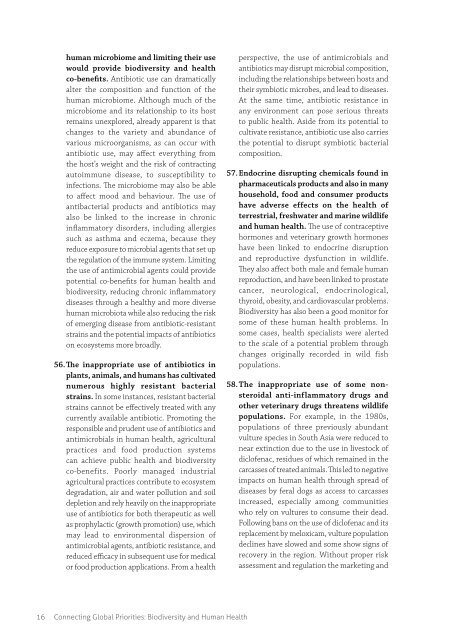Connecting Global Priorities Biodiversity and Human Health
1ZcgwtN
1ZcgwtN
Create successful ePaper yourself
Turn your PDF publications into a flip-book with our unique Google optimized e-Paper software.
human microbiome <strong>and</strong> limiting their use<br />
would provide biodiversity <strong>and</strong> health<br />
co-benefits. Antibiotic use can dramatically<br />
alter the composition <strong>and</strong> function of the<br />
human microbiome. Although much of the<br />
microbiome <strong>and</strong> its relationship to its host<br />
remains unexplored, already apparent is that<br />
changes to the variety <strong>and</strong> abundance of<br />
various microorganisms, as can occur with<br />
antibiotic use, may affect everything from<br />
the host’s weight <strong>and</strong> the risk of contracting<br />
autoimmune disease, to susceptibility to<br />
infections. The microbiome may also be able<br />
to affect mood <strong>and</strong> behaviour. The use of<br />
antibacterial products <strong>and</strong> antibiotics may<br />
also be linked to the increase in chronic<br />
inflammatory disorders, including allergies<br />
such as asthma <strong>and</strong> eczema, because they<br />
reduce exposure to microbial agents that set up<br />
the regulation of the immune system. Limiting<br />
the use of antimicrobial agents could provide<br />
potential co-benefits for human health <strong>and</strong><br />
biodiversity, reducing chronic inflammatory<br />
diseases through a healthy <strong>and</strong> more diverse<br />
human microbiota while also reducing the risk<br />
of emerging disease from antibiotic-resistant<br />
strains <strong>and</strong> the potential impacts of antibiotics<br />
on ecosystems more broadly.<br />
56. The inappropriate use of antibiotics in<br />
plants, animals, <strong>and</strong> humans has cultivated<br />
numerous highly resistant bacterial<br />
strains. In some instances, resistant bacterial<br />
strains cannot be effectively treated with any<br />
currently available antibiotic. Promoting the<br />
responsible <strong>and</strong> prudent use of antibiotics <strong>and</strong><br />
antimicrobials in human health, agricultural<br />
practices <strong>and</strong> food production systems<br />
can achieve public health <strong>and</strong> biodiversity<br />
co-benefits. Poorly managed industrial<br />
agricultural practices contribute to ecosystem<br />
degradation, air <strong>and</strong> water pollution <strong>and</strong> soil<br />
depletion <strong>and</strong> rely heavily on the inappropriate<br />
use of antibiotics for both therapeutic as well<br />
as prophylactic (growth promotion) use, which<br />
may lead to environmental dispersion of<br />
antimicrobial agents, antibiotic resistance, <strong>and</strong><br />
reduced efficacy in subsequent use for medical<br />
or food production applications. From a health<br />
perspective, the use of antimicrobials <strong>and</strong><br />
antibiotics may disrupt microbial composition,<br />
including the relationships between hosts <strong>and</strong><br />
their symbiotic microbes, <strong>and</strong> lead to diseases.<br />
At the same time, antibiotic resistance in<br />
any environment can pose serious threats<br />
to public health. Aside from its potential to<br />
cultivate resistance, antibiotic use also carries<br />
the potential to disrupt symbiotic bacterial<br />
composition.<br />
57. Endocrine disrupting chemicals found in<br />
pharmaceuticals products <strong>and</strong> also in many<br />
household, food <strong>and</strong> consumer products<br />
have adverse effects on the health of<br />
terrestrial, freshwater <strong>and</strong> marine wildlife<br />
<strong>and</strong> human health. The use of contraceptive<br />
hormones <strong>and</strong> veterinary growth hormones<br />
have been linked to endocrine disruption<br />
<strong>and</strong> reproductive dysfunction in wildlife.<br />
They also affect both male <strong>and</strong> female human<br />
reproduction, <strong>and</strong> have been linked to prostate<br />
cancer, neurological, endocrinological,<br />
thyroid, obesity, <strong>and</strong> cardiovascular problems.<br />
<strong>Biodiversity</strong> has also been a good monitor for<br />
some of these human health problems. In<br />
some cases, health specialists were alerted<br />
to the scale of a potential problem through<br />
changes originally recorded in wild fish<br />
populations.<br />
58. The inappropriate use of some nonsteroidal<br />
anti-inflammatory drugs <strong>and</strong><br />
other veterinary drugs threatens wildlife<br />
populations. For example, in the 1980s,<br />
populations of three previously abundant<br />
vulture species in South Asia were reduced to<br />
near extinction due to the use in livestock of<br />
diclofenac, residues of which remained in the<br />
carcasses of treated animals. This led to negative<br />
impacts on human health through spread of<br />
diseases by feral dogs as access to carcasses<br />
increased, especially among communities<br />
who rely on vultures to consume their dead.<br />
Following bans on the use of diclofenac <strong>and</strong> its<br />
replacement by meloxicam, vulture population<br />
declines have slowed <strong>and</strong> some show signs of<br />
recovery in the region. Without proper risk<br />
assessment <strong>and</strong> regulation the marketing <strong>and</strong><br />
16 <strong>Connecting</strong> <strong>Global</strong> <strong>Priorities</strong>: <strong>Biodiversity</strong> <strong>and</strong> <strong>Human</strong> <strong>Health</strong>


